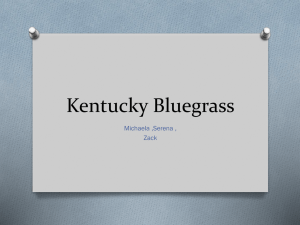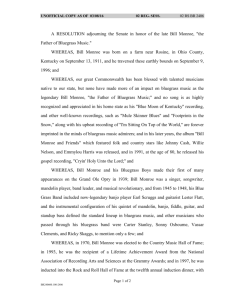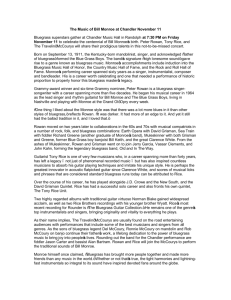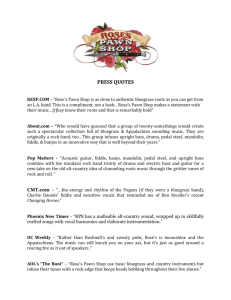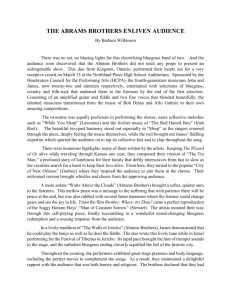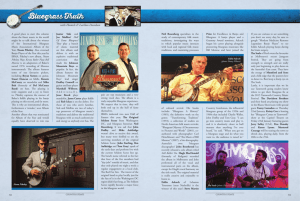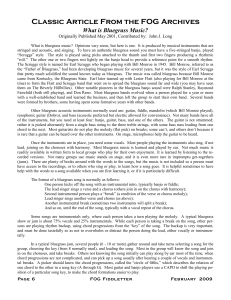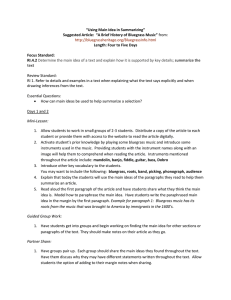Lesson 15E
advertisement
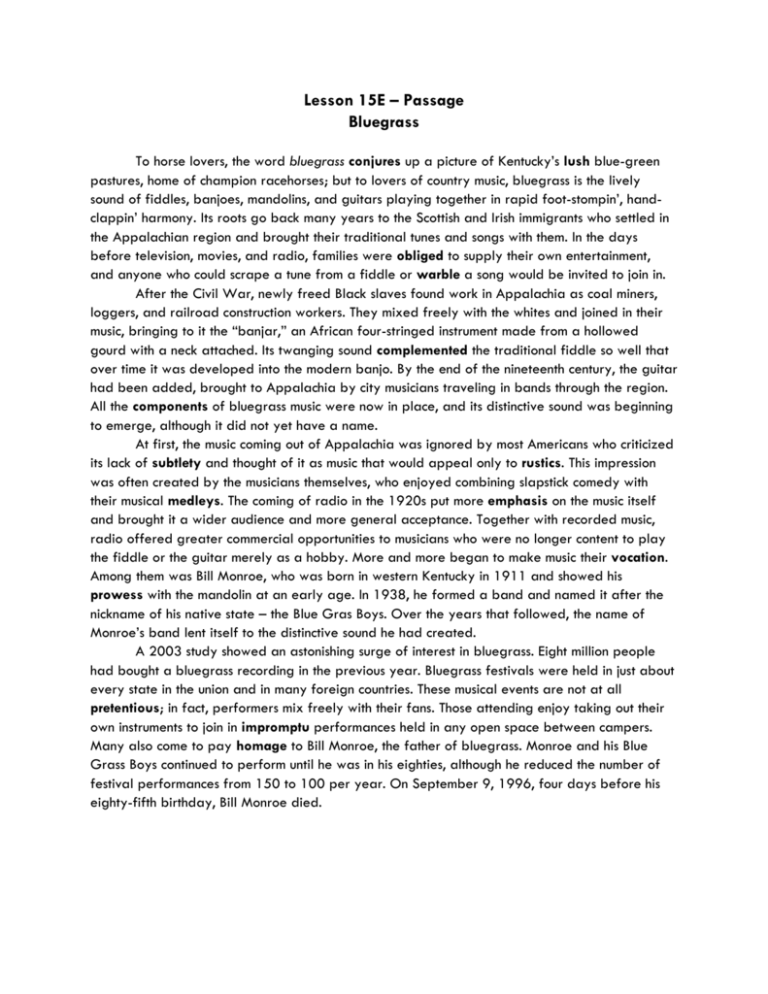
Lesson 15E – Passage Bluegrass To horse lovers, the word bluegrass conjures up a picture of Kentucky’s lush blue-green pastures, home of champion racehorses; but to lovers of country music, bluegrass is the lively sound of fiddles, banjoes, mandolins, and guitars playing together in rapid foot-stompin’, handclappin’ harmony. Its roots go back many years to the Scottish and Irish immigrants who settled in the Appalachian region and brought their traditional tunes and songs with them. In the days before television, movies, and radio, families were obliged to supply their own entertainment, and anyone who could scrape a tune from a fiddle or warble a song would be invited to join in. After the Civil War, newly freed Black slaves found work in Appalachia as coal miners, loggers, and railroad construction workers. They mixed freely with the whites and joined in their music, bringing to it the “banjar,” an African four-stringed instrument made from a hollowed gourd with a neck attached. Its twanging sound complemented the traditional fiddle so well that over time it was developed into the modern banjo. By the end of the nineteenth century, the guitar had been added, brought to Appalachia by city musicians traveling in bands through the region. All the components of bluegrass music were now in place, and its distinctive sound was beginning to emerge, although it did not yet have a name. At first, the music coming out of Appalachia was ignored by most Americans who criticized its lack of subtlety and thought of it as music that would appeal only to rustics. This impression was often created by the musicians themselves, who enjoyed combining slapstick comedy with their musical medleys. The coming of radio in the 1920s put more emphasis on the music itself and brought it a wider audience and more general acceptance. Together with recorded music, radio offered greater commercial opportunities to musicians who were no longer content to play the fiddle or the guitar merely as a hobby. More and more began to make music their vocation. Among them was Bill Monroe, who was born in western Kentucky in 1911 and showed his prowess with the mandolin at an early age. In 1938, he formed a band and named it after the nickname of his native state – the Blue Gras Boys. Over the years that followed, the name of Monroe’s band lent itself to the distinctive sound he had created. A 2003 study showed an astonishing surge of interest in bluegrass. Eight million people had bought a bluegrass recording in the previous year. Bluegrass festivals were held in just about every state in the union and in many foreign countries. These musical events are not at all pretentious; in fact, performers mix freely with their fans. Those attending enjoy taking out their own instruments to join in impromptu performances held in any open space between campers. Many also come to pay homage to Bill Monroe, the father of bluegrass. Monroe and his Blue Grass Boys continued to perform until he was in his eighties, although he reduced the number of festival performances from 150 to 100 per year. On September 9, 1996, four days before his eighty-fifth birthday, Bill Monroe died. DIRECTIONS: Answer each of the following questions in the form of a sentence. If a question does not contain a vocabulary word from this lesson’s word list, use one in your answer. Use each word only once. Questions and answers will then contain all fifteen words (or forms of the words). 1. Why is Kentucky a good place to raise horses? 2. At what stage of his life did Bill Monroe first show his musical ability? 3. Why do many fans take their instruments to bluegrass festivals? 4. Who would be especially welcome to Appalachia get-togethers in the days before radio and television? 5. Why did the banjo become popular in Appalachian music? 6. To lovers of country music, what does the name bluegrass suggest? 7. How would you describe a medley of Bill Monroe tunes? 8. What is the meaning of obliged as it is used in the passage? 9. What instruments are one component of bluegrass music? 10. Why are fans able to mix freely with musicians at bluegrass festivals? 11. What mistaken idea did some Americans have about the appeal of bluegrass music? 12. What criticism might some lovers of “fine” music make of bluegrass music? 13. Why do you think the bluegrass musicians ultimately eliminated the slapstick comedy routines? 14. How did Bill Monroe demonstrate his devotion to country music? 15. What special purpose draws bluegrass fans to Bill Monroe’s performances?
